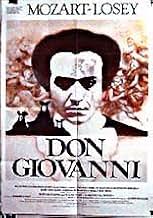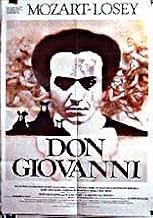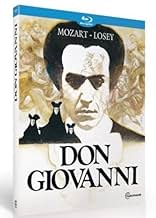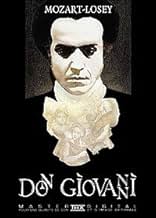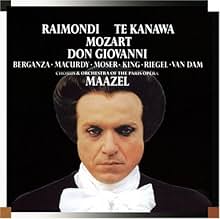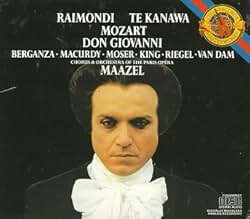Don Giovanni
- 1979
- Tous publics
- 2h 56min
NOTE IMDb
7,5/10
1,4 k
MA NOTE
Ajouter une intrigue dans votre langueMozart's opera in lush sets: Don Giovanni, the infamous womanizer, kills Donna Anna's father. He is then chased by Donna Anna's fiancé, Don Ottavio, as well as Donna Elvira, one of his forme... Tout lireMozart's opera in lush sets: Don Giovanni, the infamous womanizer, kills Donna Anna's father. He is then chased by Donna Anna's fiancé, Don Ottavio, as well as Donna Elvira, one of his former conquests. But the real threat lies elsewhere.Mozart's opera in lush sets: Don Giovanni, the infamous womanizer, kills Donna Anna's father. He is then chased by Donna Anna's fiancé, Don Ottavio, as well as Donna Elvira, one of his former conquests. But the real threat lies elsewhere.
- Réalisation
- Scénario
- Casting principal
- Nomination aux 2 BAFTA Awards
- 4 victoires et 4 nominations au total
Avis à la une
To make a movie based on an opera is a different thing from filming an opera on stage. Cinema and opera are 2 different forms of art each one with its specific techniques. Nevertheless one can be at the other's service and if the match is excellent the merits of them both will be enhanced. That's what happens with this excellent movie where we can enjoy Mozart's music and the singing talents of such extraordinary artists like Kiri Te Kanawa and others besides a lot of gorgeous and dynamic movie images, sceneries, shots and superb cut and editing. The plot everyone knows: the adventures and misadventures of D. Giovanni the king of philanderers of all times and a more or less disguised attack on aristocracy and its immoral behaviour. We are on the eve of the French Revolution and as everybody also knows Mozart was a freemason and a democrat.
I enjoyed it very much. I'm fairly new to the whole wide world of opera but this was very entertaining. But what do I really comment on? Mozart's work, or the movie adaptation of it? Mozart of course is incredible. I love the opening scene, the closing scene and pretty much everything in between. My biggest problem, and I assume that this is true with opera in general is that once I passed the point that I had reached in familiarity from listening to a recording of it, the music was lost to me. I paid more attention to the words and what was going on in the plot than the music.
As for the movie adaptation, aside from it being very strange to watch and listen to an opera written more than 200 years ago on my modern television, I found it enjoyable. Yes, the preceding comment is true that the expressions were exaggerated and more fit for a stage but I don't feel they were inappropriate either. As far as sets and costumes and quality, I have very little basis of comparison, as I have not seen it on stage, or any opera for that matter.
In short, I found it to be very good, though I'm probably one of the very few sixteen year olds who would agree with that.
As for the movie adaptation, aside from it being very strange to watch and listen to an opera written more than 200 years ago on my modern television, I found it enjoyable. Yes, the preceding comment is true that the expressions were exaggerated and more fit for a stage but I don't feel they were inappropriate either. As far as sets and costumes and quality, I have very little basis of comparison, as I have not seen it on stage, or any opera for that matter.
In short, I found it to be very good, though I'm probably one of the very few sixteen year olds who would agree with that.
This is such an outstanding display of cinematic and operatic talent that it should be seen by anyone with any interest in either. It introduced me to opera when it came out so I am eternally grateful.
I'm waiting for the DVD and check here regularly for news. I thought that it had finally arrived in Germany, judging from the display on the iMdb page. Alas, that seems to be a different animal altogether, so we're still waiting. I'll try to get them to fix the link.
Who does one lobby to get a DVD released?
I'm waiting for the DVD and check here regularly for news. I thought that it had finally arrived in Germany, judging from the display on the iMdb page. Alas, that seems to be a different animal altogether, so we're still waiting. I'll try to get them to fix the link.
Who does one lobby to get a DVD released?
A fascinating film that seems to be operating on several levels at once. It was hard for me sometimes to just listen to it as an opera, because I felt that there were so many messages being imparted through the sets, landscape and especially the extras who continually move about the scene as the main characters sing and act their stories. Others have observed that the common people are present everywhere, and yet just ignored by Don Giovanni; he even conducts his attempted seduction of Zerlina with half a village standing on the steps and watching. As an aristocrat, he doesn't even acknowledge the existence of these underlings, and can do what he wants without worrying about their opinion or their interference. Nor is this just the behavior of a bad man; Don Ottavio is much the same during one of his arias (I think it is 'Il mio tesoro') when he is walking about declaiming as peasants dot the lawn, taking their afternoon siesta. Perhaps the point is not so much to accuse anyone of being deliberately cruel, as to underline how absolutely divided the aristocracy is from the common people. Not only do the aristocrats ignore the commoners, the commoners seem to be pretty oblivious to the aristocrats, too. No matter what Don Giovanni gets up to, the work of the peasants just goes on - he may wander down to the kitchen once in a while to give a little speech and pinch a serving wench, but it makes very little difference to anyone if he's present or not. The whole of this society seems as artificial and fragile as Don Giovanni's lace sleeves; this is a world that is almost at the limit of its ability to hold together under the weight of its contradictions.
Ruggero Raimondi is a terrific Don Giovanni - handsome, graceful and charming, but with a hardness in the line of his mouth and his eyes that creates a very disturbing feeling of danger. Zerlina, though attracted, seems to sense that there is something wrong about him, though she isn't quite sure where to attribute the feeling of fear he inspires in her. Teresa Berganza was my favorite of the 3 main ladies; Edda Moser seemed very grim after her opening scene, and Kiri Te Kanawa reminded me irresistibly of Madeleine Kahn in "Young Frankenstein", especially with that tall silver-powdered hairdo. The silent servant played by Eric Adjani was another one of the puzzles that I felt this movie kept posing me. He seems to be a younger version of Don Giovanni, and one who is present almost as Don Giovanni's spirit, when the actual man is not there. During moments of crisis, he almost always watches Don Giovanni, not the action that is taking place outside him, and only Don Giovanni seems to really look at him. In the finale, he is almost like Banquo's ghost, sitting in Don Giovanni's chair until the master confronts him, and when the Commendatore's statue appears, Don Giovanni almost seems to bid him goodbye as he passes. I think the servant is Don Giovanni's conscience, the age when Don Giovanni, as a young man, cast him off and turned to evil. Now he follows him like a ghost of himself, observing but unable to influence.
Ruggero Raimondi is a terrific Don Giovanni - handsome, graceful and charming, but with a hardness in the line of his mouth and his eyes that creates a very disturbing feeling of danger. Zerlina, though attracted, seems to sense that there is something wrong about him, though she isn't quite sure where to attribute the feeling of fear he inspires in her. Teresa Berganza was my favorite of the 3 main ladies; Edda Moser seemed very grim after her opening scene, and Kiri Te Kanawa reminded me irresistibly of Madeleine Kahn in "Young Frankenstein", especially with that tall silver-powdered hairdo. The silent servant played by Eric Adjani was another one of the puzzles that I felt this movie kept posing me. He seems to be a younger version of Don Giovanni, and one who is present almost as Don Giovanni's spirit, when the actual man is not there. During moments of crisis, he almost always watches Don Giovanni, not the action that is taking place outside him, and only Don Giovanni seems to really look at him. In the finale, he is almost like Banquo's ghost, sitting in Don Giovanni's chair until the master confronts him, and when the Commendatore's statue appears, Don Giovanni almost seems to bid him goodbye as he passes. I think the servant is Don Giovanni's conscience, the age when Don Giovanni, as a young man, cast him off and turned to evil. Now he follows him like a ghost of himself, observing but unable to influence.
Le saviez-vous
- AnecdotesThis opera film features one character who does not appear in the original source Wolfgang Amadeus Mozart 'Don Giovanni' opera, a Valet in Black. The screenplay described this character as "an observer whose presence must always be felt, the guardian - in metaphysical terms - of Don Giovanni's soul". The Valet in Black is present and unspoken in nearly every scene that Don Giovanni is in.
- ConnexionsFeatured in Naked Opera (2013)
Meilleurs choix
Connectez-vous pour évaluer et suivre la liste de favoris afin de recevoir des recommandations personnalisées
- How long is Don Giovanni?Alimenté par Alexa
Détails
- Date de sortie
- Pays d’origine
- Site officiel
- Langue
- Aussi connu sous le nom de
- Don Juan
- Lieux de tournage
- Sociétés de production
- Voir plus de crédits d'entreprise sur IMDbPro
Box-office
- Budget
- 7 000 000 $US (estimé)
- Montant brut mondial
- 9 519 $US
Contribuer à cette page
Suggérer une modification ou ajouter du contenu manquant

Lacune principale
By what name was Don Giovanni (1979) officially released in Canada in English?
Répondre
